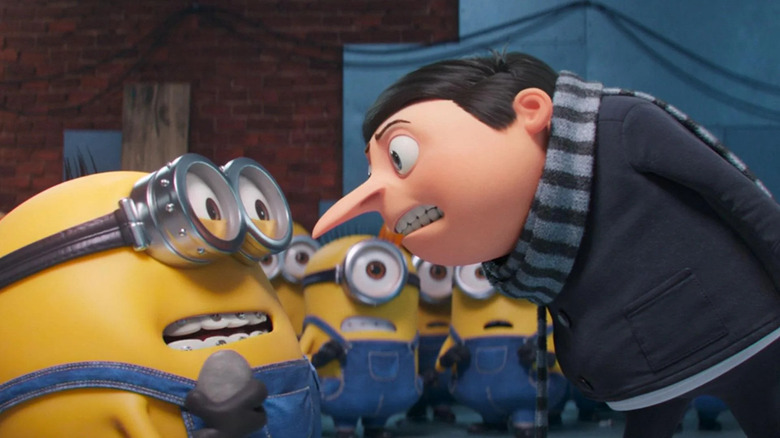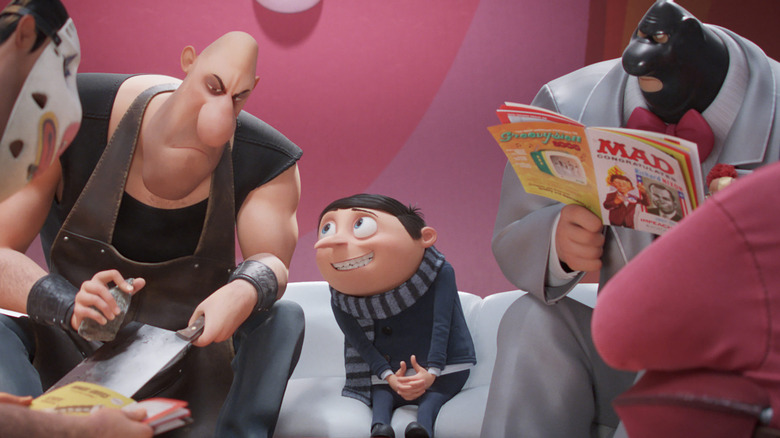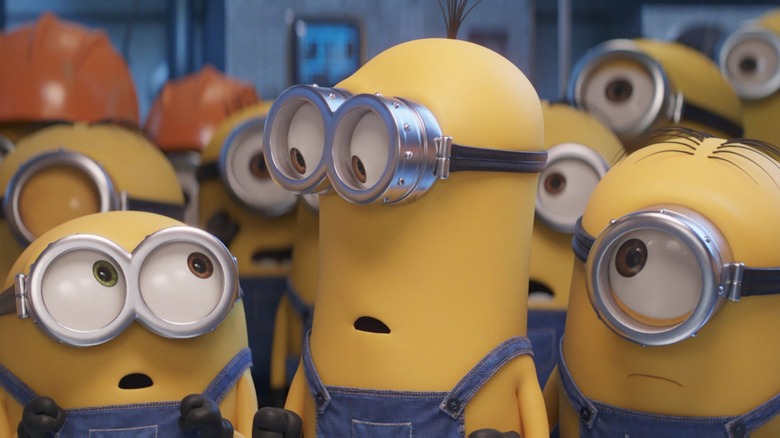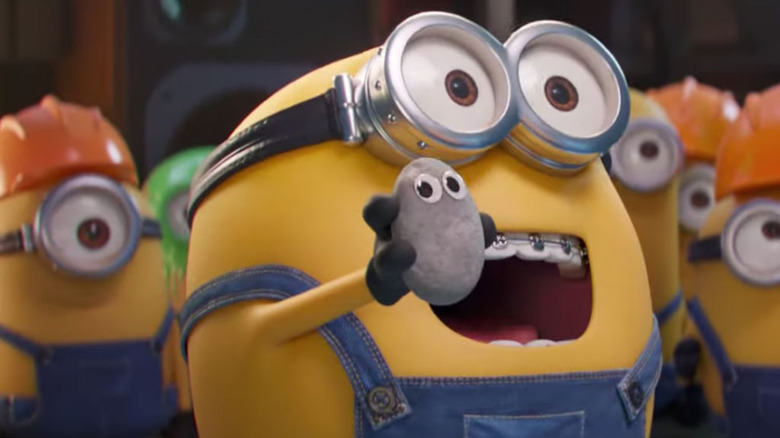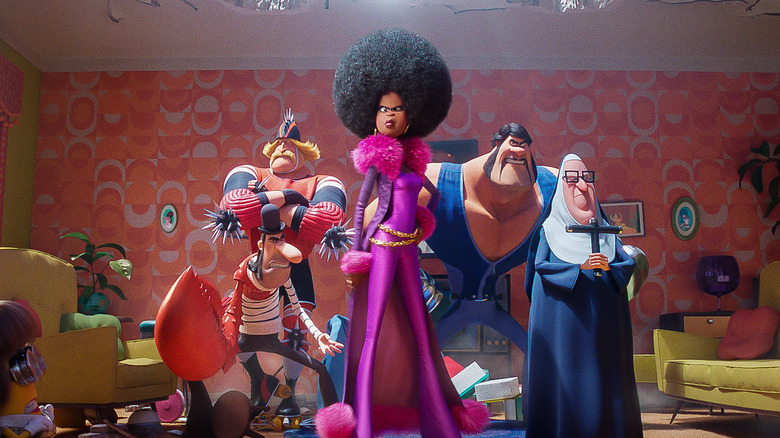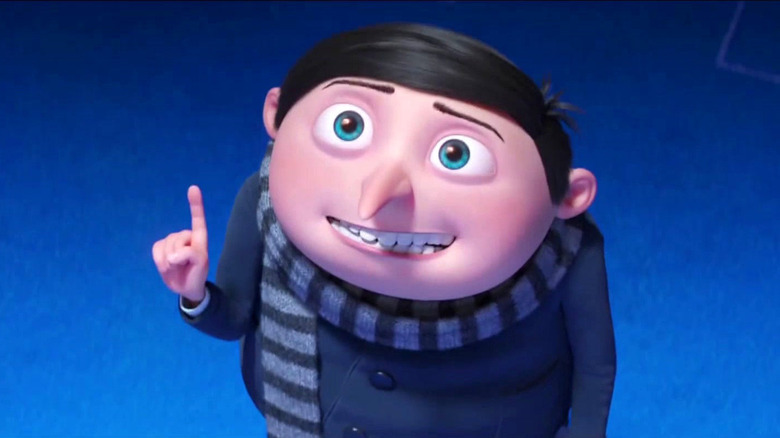Breaking Down Every Major Song We Heard In Minions: The Rise Of Gru
Mix tapes are a delicate science. Nick Hornby declared as much in his 1995 novel "High Fidelity," wherein he pontificated on the proper placement of songs, the flow of one song into another, and his intense concerns as to what kind of messages a properly thought-out playlist would communicate to the intended recipient. To quote:
"To me, making a tape is like writing a letter. There's a lot of erasing and rethinking and starting again. A good compilation tape, like breaking up, is hard to do."
As Sarah Vowell once said on "This American Life," a homemade tape is a work of friendship. And she is right. There can be an intimacy to a mix. A declaration of time, of mood, of intent. That notion is certainly true of a good soundtrack record, which can speak more to a film's tone than the use of and kind of carefully assayed visual language. An audience will be able to shake hands with a film based on its music alone.
With that in mind, some assessment is in order: What kind of message is the soundtrack for "Minions: The Rise of Gru" sending to its audience with its collection of now-standard 1970s hit songs?
'You're No Good' by Linda Ronstadt
Kyle Balda's "Minions: The Rise of Gru" is set largely in San Francisco in 1976, when the titular Gru was a mere 11 ¾ years old. Several scenes of the film's action take place inside of — or in a mysterious chamber below — a music store called Criminal Records. Gru, to remind readers, aspires to be one of the world's most notorious supervillains, and the titular Minions aspire only to aid him in his endeavors.
In the film, the young Gru (played by Steve Carell with his voice artificially pitched up) receives an invitation to fill in an empty spot on The Vicious Six, a famed supervillain team that was recently reduced to five. In order to enter the evil team's enclave, Gru must give a password to a record store clerk and be shown into an empty listening booth where he is meant to play Linda Ronstadt's "You're No Good" from her 1974 record "Heart Like a Wheel." The record, when run backwards, opens a trap door in the floor.
"You're No Good" was written Clint Ballard, Jr. in 1963, was originally performed by Dee Dee Warrick, and was covered — to great chart success — by Betty Everett that same year, and by The Swinging Blue Jeans the following year. Ronstadt's version was the most popular version, hitting #1 on the Billboard Hot 100.
"Minions" only cares to play with the song's title; Gru and his villainous compatriots only aim to be "no good," and the lyrics to the song (it's a breakup song about leaving behind a no-good lover) are ignored in favor of its title. Fitting, as the entirety of the song is not used.
'Cecilia' by Simon & Garfunkel
In most of the "Despicable Me" movies, the Minions, typically depicted as feckless, bickersome children, have a scene wherein their solidarity is expressed through whole-group renditions of notable pop songs, presented in their own particular gibberish language. In the past they have performed "Another Irish Drinking Song" by Da Vinci's Notebook, "The Major General Song" from "Pirates of Penzance," and "Y.M.C.A." by The Village People. In "The Rise of Gru," the Minions perform "Cecilia" by Simon & Garfunkel, using the clattering vehicles and machinery in Gru's lab as percussion.
"Cecilia debuted on Simon & Garfunkel's hit album "Bridge Over Troubled Water" in 1970, and was used again on "Greatest Hits" in 1972. It peaked at #4 on the Billboard Hot 100, although it was likely not charting nearly as high by '76 when "Minions" takes place. It seems that the Minions, while largely clueless to some of the larger machinations of the world, do have a line on popular culture — at least enough to learn these songs and pass them around among themselves. The story goes that Simon & Garfunkel composed the song at a party, using a piano bench as a percussion instrument, giving the song a loose, raucous origin. If any group of kid-friendly critters can relate to late-night party raucousness, it's the Minions.
'Blitzkrieg Bop' by The Ramones
Hard rock and fast music are often used in movies as an unfortunate shorthand to denote that a character is evil. I say unfortunate, as perfectly decent people are perfectly capable of enjoying The Ramones. The story of "The Rise of Gru" centers on a magical coin, emblazoned with gems, that is highly sought by the Vicious Six. During the film's mayhem, the coin briefly comes into the hands of a bratty suburban kid after it's given to him by the Minion Otto in exchange for a Pet Rock. When the Minions return to the boy's home to retrieve the MacGuffin, he is heard listening to The Ramones.
The Ramones are one of punk's seminal acts, and their fast-and-loose sound — essentially surf music played quickly and loudly to cover the band's lack of musical virtuosity — is often used to pump a scene full of energy while also communicating rebellion and gleeful destruction. "Blitzkrieg Bop" is a pat, easy track that seems almost incidental to its scene. A kid is listening to the Ramones in the mid 1970s. All one might be able to ponder is how hip that kid is.
'You Can't Always Get What You Want' by The Rolling Stones
Several Minions movies have ended with a glorious Minionese rendition of a popular song, often presented at a large event, notably a wedding. One film ended with All-4-One's "I Swear." The previous Minions-only adventure had a post-credits rendition of The Beatles' "Revolution." The climactic song at the conclusion of "The Rise of Gru" is The Rolling Stones' 1969 hit "You Can't Always Get What You Want." No spoilers, but the scene in which the song appears is a melancholy occasion. The song is used to show Gru and his Minions emotionally in tune for the first time.
"You Can't Always Get What You Want" is a sad song that, to some ears, may be about failed revolution. It describes miniature scenarios wherein the narrator has lost something: a woman at a reception, the positive opinion of a dying man, their own ability to be heard. But if you try sometimes, you just might find ... you get what you need. The glorious choral crescendos will elevate any movie.
However, thanks to Martin Scorsese's prolific use of the Rolling Stones, perhaps a moratorium ought to be held on their music for a few years. Older viewers have heard Stones songs plenty in many, many movies. Of course, there is an argument against this point, elucidated below.
Soundtrack overview
The timeframes of these movies ("Minions" is set in the late '60s, the new film in '76) are dictated by Gru's age in the original "Despicable Me." Their soundtracks, though, are not from Gru's own personality, as they lazily and bluntly use their selections to denote little beyond the era. There are no deep cuts, no clever use of lyrics, no obscure bands that a passionate music supervisor ached to share with the world. They seem like automatically generated playlists derived from feeding a series of years into an algorithm, and all it could muster was nostalgic hits of the day. To those old enough, the "Minions" soundtracks are going to be pat and predictable.
Note above, however, the phrase "older viewers." The Minions films are made with a younger audience in mind, and while the parents — and grandparents — in the audience may be intimately familiar with the songs in question, the "Minions" movies seem to be making an effort to put them in kids' ears. There was a time when the pop hits of the '60s and '70s denoted anger, rebellion, sex, and danger. They were a defiant and dangerous art to fight the adult systems binding youth listeners. Talkin' 'bout my generation. Over the decades, however, those same songs become powerless, eventually used as nostalgia and comfort food for youths who have now aged into adults. The songs no longer speak for the upcoming generation.
The "Minions" movies, in presenting the songs in a colorful adventure movie context, may be giving kids their first taste of certain rock classics — classics that still have power for those kids to tap into.
